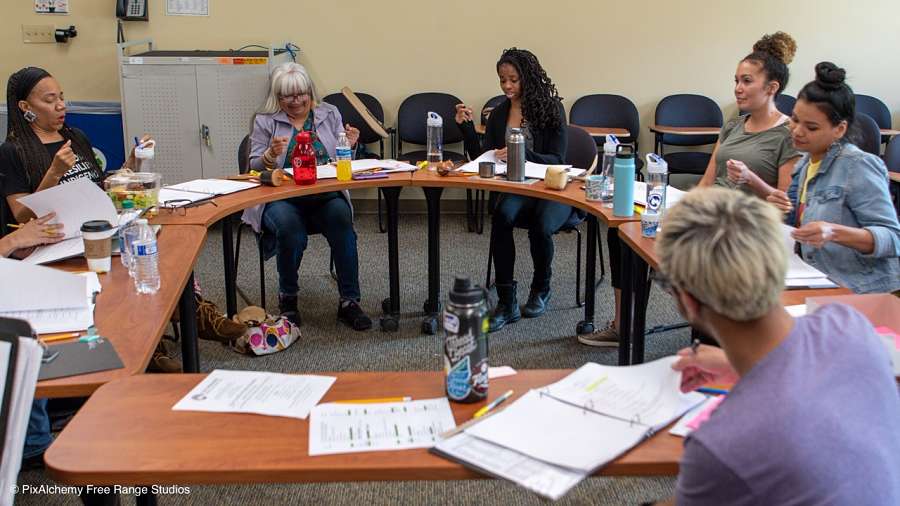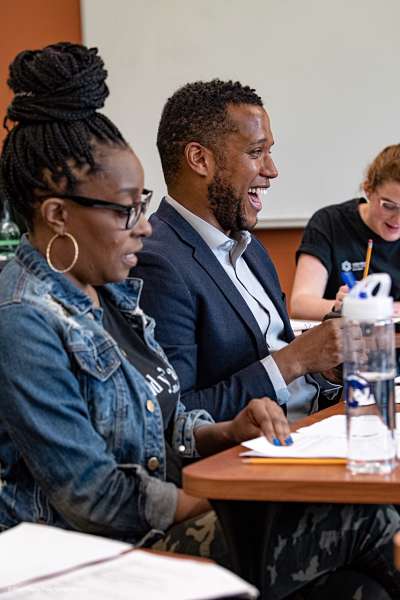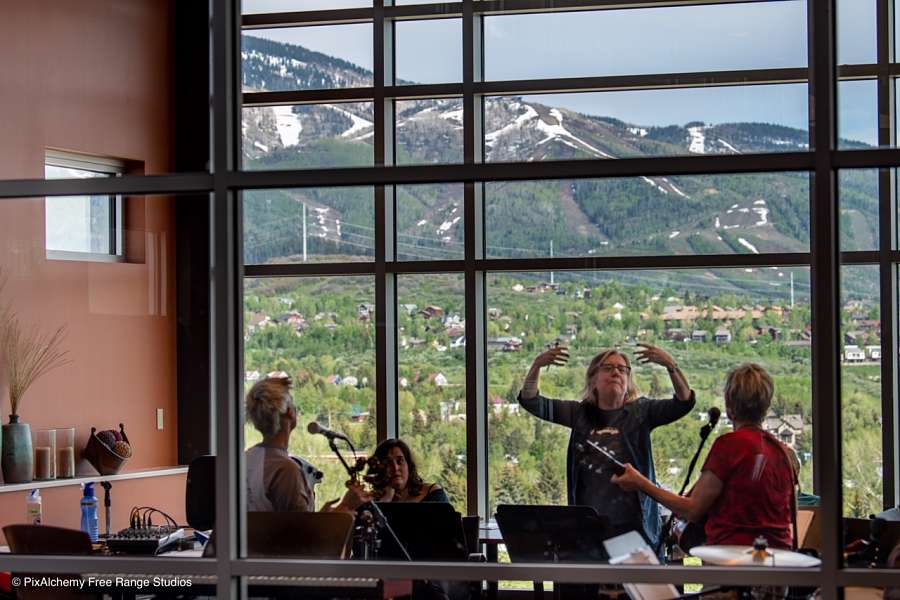In a classroom-turned-flophouse rehearsal space, a wolf rests near a music stand, his posture suggesting a lean vigilance. It was Day Two of rehearsals for Refuge, being workshopped at the Colorado New Play Festival in Steamboat Springs. The wolf had a cloth-covered head, a chicken-wire torso, narrow PVC cylinder legs. A similarly skeletal dog laid in repose on the other side of the room, attached to crossbar slats by strings.
Who knows what the puppets populating Refuge will look like when Andrew Rosendorf’s play lands onstage in a full production? Or even when Curious Theatre Company, which commissioned the work, puts Refuge through two more workshop iterations? But in their debut in room SB210 of Colorado Mountain College, they were endearing and evocative. Here were the bones of two magic-realist characters in a drama about a Texas rancher, a Latina border patrol agent, and a Honduran migrant.
The Colorado New Play Festival, which ran June 3-8, is intent on helping theatres and their chosen playwrights add flesh to the bones of new work. If that sounds a bit stark, it was fitting for this year’s five offerings, which were unafraid to rattle, to hint at violence, to take on loss, to imagine redemption or leave heartache unhealed.
The week-long gathering, once known as the Perry-Mansfield New Works Festival, was renamed by executive producers Jim and Lori Steinberg and artistic director Andrew Leynse when the fest separated in 2018 from the distinguished performing arts camp located in Colorado’s Yampa Valley. Though this was technically the festival’s 22nd installment, it was in some ways only its second. This was the first year the new board met, and the CNPF’s 501(c) (3) status is pending.
“We joked last year that we were a 21-year-old startup,” Jim Steinberg said one afternoon between the weekend’s public readings. A pretty successful one, it appears: the festival’s budget at the end of its Perry-Mansfield years was $85,000, and this year it was $200,000. “Hopefully we’ll continue to grow and do more things,” said Steinberg, a trustee of the culture-beneficent Harold & Mimi Steinberg Charitable Trust.
This year also brought into clearer focus the festival’s niche mission: to invite theatre companies to bring a playwright to the mountain town of Steamboat Springs for an intensive week of craft, regardless where the work is in its development process. “Our model is, we reach out to institutions that we think are a good fit for the fest and ask them if there are any plays they’re developing for which this would be a significant step in the development of that project,” said Leynse, taking a break from tech at the historic Chief Theater on the town’s main street. “For many institutions, you don’t always have the resources to do a lot of workshops. This really provides an important opportunity to attend the festival, be in this beautiful setting, but also be able to work with the people you want to work with.”
In addition to Curious and Rosendorf, this year’s theatres and playwrights were Steppenwolf Theatre Company and Branden Jacobs-Jenkins; South Coast Repertory and Caroline V. McGraw; the Public Theater and creators-composers Martha Redbone and Aaron Whitby, with book writer Naomi lizuka; and City Theatre Company and composer-creator Jill Sobule, and writer Liza Birkenmeier.
Though plays do not have to be complete to win a spot here, the festival’s impressive track record indicates a certain eye for promising work. Last year Curious workshopped Bruce Graham’s college football expose Sanctions, which is ending its Denver run this Sunday. Other 2018 alums include Lucas Hnath’s The Thin Place, which bowed earlier this spring at Actors Theatre of Louisville and is headed for New York’s Playwrights Horizons next season, and Kate Hamill’s Little Women, currently at New York’s Primary Stages (where Leynse is artistic director).

If the Colorado New Play Festival moniker sounds familiar, it may be because each year, the Denver Center for the Performing Arts hosts the Colorado New Play Summit. That gathering brings playwrights to town each winter for a two-week workshop culimating in both a public and an industry weekend. The Denver Center often gives two of the summit plays world premiere productions in its next season.
Steinberg, who had a long relationship with the Denver Center, resigned the board when the theatre company parted ways in 2016, when artistic producing director Kent Thompson was let go from DCPA. Thompson had created the new-play summit and was also a longtime participant in the Perry-Mansfield Festival, so Steinberg acknowledges it’s fair to wonder whether the festival’s new name is a shot across the bow at the regional behemoth. Not so, he said. “Believe it or not, it had nothing to do with the Denver Center. We were trying to come up with a new name after Perry-Mansfield. I’m very simple-minded and wanted a name that said who we are.”
Leaving aside theories about the overlapping names, the two events prove more complementary than competitive. And the one-two punch of the liberated festival and the summit should only further elevate Colorado’s profile as a creative hub for nonprofit theatres and compelling playwrights.
The week’s rehearsals are open to the public. So festgoers might have witnessed McGraw and director Kate Sullivan teasing out the intent and possibilities in a couple of scenes between Hazel (Clea Alsip) and Mitch (Cesar Rosado). One has Hazel being prickly with the husband she can’t remember since an accident on their honeymoon. Another is a flashback to when they met cute. It’s focused work, a tender grasping for the connections. At one point, McGraw tilted her head back, looking at but not likely seeing the ceiling, a little stumped. “I don’t know,” she said of the scene. “But it has to do a lot of things.”
On Day Three, the halls were alive with the sound of…well, you know. The all-female cast of Black Mountain Women was hitting notes that flowed from African American spiritual to Native American song-chant and shaking rattles. Actor Soni Moreno made use of a packet of peanut M&Ms. And Refuge composer/performer Satya Jnani Chavez and actor/translator Marialuisa Burgo were working out a strumming arrangement on guitars.
“It’s about the work being done in the room,” Leynse emphasized. So the mantra became “follow that guitar riff.” The clangorous notes bleeding into the linoleum-tiled hallway almost certainly belonged to Jill Sobule’s rock-confessional musical F*** 7th Grade. But where were they coming from? Up a broad staircase, a three-piece band fronted by the singer/songwriter/star was facing a panoramic view and jamming in a large conference room. On the nearby mountains, ribbons of snow were thinning in the June sun.
The writer of the 1990s pop hits “I Kissed a Girl” and “Supermodel” was rocking her guitar, belting lyrics (“Gonna get me some … gonna get me some…gonna … ”) and intermittently monologuing. Director Lisa Peterson occasionally interrupted the singer, her bassist and drummer with suggestions. It was rock, chat, repeat. Rock, chat, repeat.
Pittsburgh’s City Theatre Company has slotted the musical memoir, about Sobule’s tender time as an understandably clueless queer girl as well as the tribulations of coming out in the music biz, for May 2020. The musical’s setup is that of an intimate rock show, casting the actual audience as a fictional one, or vice versa. Breaking character during the next night’s staged reading, Sobule confided to the festival audience. “There’s so much to think about with this acting shit.”

At the playwright’s salon, held at a warm, art-laden ranch outside of town early in the workshop, the evening’s discussion among the playwrights provided a far-ranging introduction to the varied works and their equally varied writing processes. Redbone talked about the question that had nagged her mixed-race family for decades: Why had a Native American ancestor, rounded up and sent from Appalachian Kentucky to Oklahoma in the mass relocation known as the Trail of Tears, returned to coal country? “Why did he come back?” asked the composer with the long braids and commanding voice, as gentle as it is direct. Rosendorf described the U.S. border strategy of “death by deterrence” (using unforgiving terrain to thwart migrants) that had compelled him to set Refuge on a ranch 70 miles north of the Texas-Mexico border.
Jacobs-Jenkins was sitting next to moderator Chip Walton, in front of big windows offerings views of mountains and acres of greening hay. Asked about the different forms his plays have taken, he told Walton (whose Curious Theatre Company has singlehandedly introduced Denver audiences to the MacArthur Fellow’s work, mounting regional premieres of Appropriate and Gloria), “I allow the play to tell me the form it wants to take.”

His new play, though, was being a bit tight-lipped about what it wants to be. The process, he said, was proving “slower than I thought it would be.” He had 30 or so pages when he sat down for Tuesday’s salon; the reading on Friday lasted around 45 minutes.
The reading for Black Mountain Women wasn’t much longer, as writer Naomi lizuka was just beginning to dig in. But patience with the process is exactly what the festival both preaches and practices. “Lucas Hnath only had 28 pages when he left the festival last year,” noted Leynse, underscoring the fest’s commitment to the development process at whatever stage. “If we don’t get to a full-length play by the end of the week, it’s not seen as a loss.”


